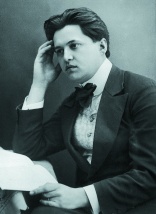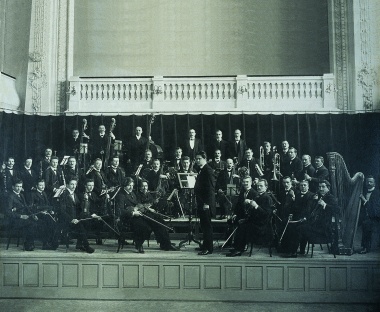First Slovenian philharmonic
In the autumn of 1908 national conflicts between the Germans and Slovenes reached boiling point. Protest demonstrations, breaking up the storefronts of German cafes, removing German inscriptions and other actions united the Slovenes. The army mediated and shot at the demonstrators. Funeral ceremonies caused new Slovene manifestations. As a result: Ljubljana got the Slovenian image.
During this time, preparations were being made to transform the old “society band”, established in 1900, into the new Slovene concert orchestra. The orchestra was an indispensable necessity for Slovene music, and without it the work in the Slovene opera would be difficult. The new orchestra was established on October 23, 1908, in agreement with the Glasbena matica and named the SLOVENE PHILHARMONIC. The bandmaster was a young Czech conductor Vaclav Tálich. As a result of the financial conditions, the orchestra had to perform as a former “society band” at entertaining events and various ceremonies and the “laden tables” at the Union restaurant. The first concert performance was a complete success.
In a short time, Tálich became a central musical personality in Ljubljana, which didn’t please some people. With his work, he gave new impulses to Slovenian music, as during this time, Slovene works for the orchestra were also produced. In the first season of his work, the Slovenian Philharmonic Orchestra performed 190 times, two of which were performed on two large symphonic concerts, but mainly played at various events, with “laden tables” and such. Performances in the theatre were not counted in.
Graz news, which as a rule at that time were not favorable to Slovenes, verbally attacked the Slovene Philharmonic Orchestra in March 1911 as “the inferior restaurant music” that lives at the expense of the famous Philharmonic Society in Ljubljana, and complained of it as “the crux of fraud, theft” and so on.
Tálich left Ljubljana for such a kind of culture.
Pavel Kozina complained in the Novi Akordi (Slovenian musical newspaper at that time): “Is it not typical and sad for the music scene in Ljubljana that everything that is capable and successful must be removed?”

The establishment of the Slovenian Philharmonic Orchestra was a courageous act of young Slovene culture, which, with smart politics, could become the bearer of musical life in the instrumental field.
However, they were not uniform about him in the Glasbena matica, even less in Ljubljana’s current politics. The Slovene Philharmonic was supported by the Ljubljana City Council and regarded as liberal, consequently, the regional clerical committee did not provide support. The struggle between the two main political camps in Slovenia, between clerics and liberals, which began in the 1990s, lasted and gained ever-worn forms until the First World War. The third important factor was the Germans in all areas well organised and with great support outside of Carniola. Slovenian-German relations were never good, and there was always a lot of friction.
A particular chapter is the relationship of the clerical party to the cultural institutions that they regarded as “liberal”. These were the Slovene Philharmonic Orchestra, the Glasbena matica and the Provincial Theater, the clerical party withdrew their support. When the theatre collapsed, the Slovene Philharmonic also fell. With this, for a long time, the normal development of Slovene music culture, especially the field of instrumental music, was avoided. Soon after his dissolution, the first world war broke out, which even further disrupted the musical work in Slovenia and reduced it to a minimum.
With the outbreak of World War I, difficult times began for the Philharmonic Society.
Many musicians were on the front. In these difficult times, a meritorious and diligent violinist, concertmaster Hans Gerstner took the rudder of the company into his own hands. Concerts were less frequent than before the war, but the Philharmonic Society stayed active. At the end of the war, he was appointed as a music director of the Philharmonic Society due to his many merits for musical life and musical education he gained from his arrival in 1871 in Ljubljana. Gerstner did not occupy this position for a long time because of the quick dissolvement of Philharmonic Society in the new country without being able to find the right replacement for it. The lack of a symphony orchestra in the new state of Slovenes, Croats and Serbs meant a severe impoverishment of musical life in Ljubljana.
